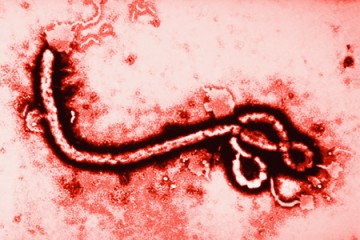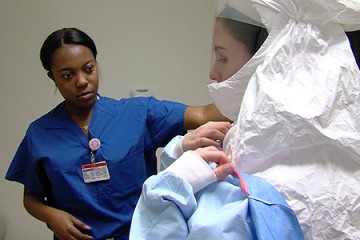Johns Hopkins University is discouraging faculty, staff, and students from traveling to West Africa until further notice due to the Ebola outbreak there.
The new travel guidance was announced Friday in an email message from Gabor D. Kelen, director of the Office of Critical Event Preparedness and Response and director of the Department of Emergency Medicine at Johns Hopkins Medicine; and Trish Perl, senior epidemiologist and a professor of medicine and infectious diseases at the Johns Hopkins schools of Medicine and Public Health.
The message outlined requirements in place regarding any Johns Hopkins-related travel to Guinea, Liberia, and Sierra Leone, the three countries where the outbreak is centered.
"The potential for someone in our community to acquire Ebola and to place others in danger weighed heavily in the university's decision to provide this guidance," Kelen and Perl wrote.
"The possible consequences of travel to these countries are particularly serious in view of the virulence of Ebola, the intensive community and health-facility transmission patterns, and the underdeveloped health systems currently in these countries."
The Ebola virus has claimed more than 4,500 lives as of Friday, according to the World Health Organization, with the vast majority of those affected in Liberia, Sierra Leone, and Guinea.
The first confirmed case in the U.S. was diagnosed on Sept. 30 at Texas Health Presbyterian Hospital in Dallas. The patient, Thomas Eric Duncan, had recently traveled to the U.S. from Liberia. He died on Oct. 8, and two nurses charged with his care have since been diagnosed with the Ebola virus.
Specific guidance for Johns Hopkins-affiliated individuals who plan to travel to West Africa includes notification of deans and department chairs and/or divisional or unit leaders. Upon return, Johns Hopkins Occupational Health, the Maryland Department of Health and Mental Hygiene, and Johns Hopkins Infection Control will make a determination about an individual's level of exposure and, based on risk, will determine if the individual can return immediately to school or work or needs to remain at home in quarantine.
Complete guidance is available online for download at insidehopkinsmedicine.org/cepar.
"We greatly appreciate each of you taking the time to review the entire guidance," Kelen and Perl wrote. "Following this guidance is the right thing to do as affiliates of an institution deeply committed to medicine and public health and to our communities' health and safety."
Posted in Health, University News
Tagged public health, epidemiology, infectious disease, ebola









